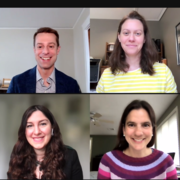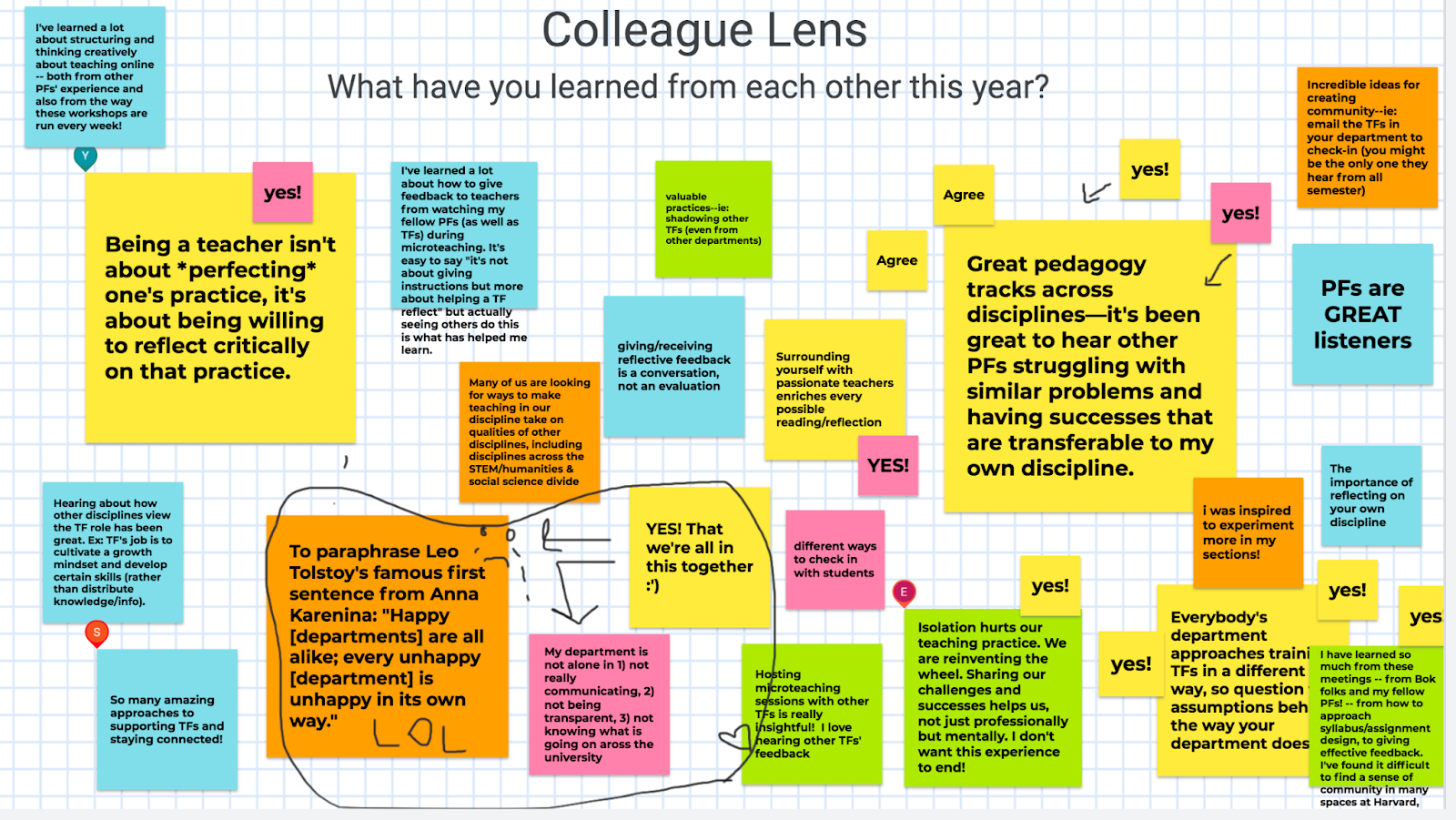
Teaching is a collaborative act, and the Pedagogy Fellows Program is by definition a community of practice. Every year, approximately 34 experienced and creative graduate students from 28 departments and programs across the FAS come together at the Bok Center to support their peers in their roles as undergraduate teachers by leading pedagogy seminars and workshops, consulting with Teaching Fellows (TFs), and developing resources on teaching and professional development. Over the course of the year, we meet regularly as a large group to explore key topics in teaching and learning, discuss and troubleshoot teaching questions that arise, and build a network around graduate student teaching and professional development.
When we learned in the spring of 2020 that we would have to run a full year of the program online, we had so many questions about how it would work. What would remote teaching be like? How could the Pedagogy Fellows support graduate student teachers with new skills when they themselves had not taught online? In addition to these very real questions all Harvard instructors were thinking about, one of our biggest concerns was how we would build a sense of community with the cohort, and how the Pedagogy Fellows in turn could build community in their home departments.
We tried different strategies and online tools to increase opportunities to connect and share. Previously, we met once or twice a month in person; this year we adjusted our meeting schedule to meet weekly, for a shorter time, to maintain connections with the group. We tried out Padlet, Google Jamboard, and even Spotify, creating a PF playlist that played at the start of every meeting. Our experiences with these tools informed our work across the Bok Center, as we were simultaneously consulting with faculty and TFs on ways to make their Zoom classes more interactive and engaging. Our Slack space became more active than ever before, with fellows sharing questions and resources regularly. Additionally, fellows completed a bi-weekly check-in form, reflecting on recent successes and challenges in their work. We used these reflections to plan upcoming meetings as well as to help us all stay in touch between meetings.
The Pedagogy Fellows’ work and their reflections on the year show the success of our efforts. In one of our final meetings, we asked the group to reflect on what they learned in the program, and this image shows their responses to what they learned from each other:

You can see that the fellows took away ideas about teaching, community, and their own disciplines:
- Being a teacher isn’t about perfecting one’s practice; it’s about being willing to reflect critically on that practice.
- Isolation hurts our teaching practices. We are reinventing the wheel. Sharing our successes and challenges helps us, not just professionally but mentally.
- Great pedagogy tracks across disciplines.
- Surrounding yourself with great teachers enriches every possible reading/ reflection.
- Hearing about how other disciplines view the TF role has been great. Ex: A TF’s job is to cultivate a growth mindset and develop certain skills (rather than distribute knowledge).
As Alexander Creighton, Pedagogy Fellow in English, shared:
“Thank you for all you did to administer a genuinely successful Bok Pedagogy Fellowship program despite the seemingly impossible challenges that this year has presented...I feel as though I leave my role as Fellow with as much knowledge as if I had taken a full, in-person seminar. That is a reflection on how professionally and brilliantly you all rose to the challenge, to make this year not one of just getting by, but of actually taking advantage of the affordances of online learning while also being flexible and adaptive.”
The program culminates with a capstone assignment, which is designed to allow the PFs to showcase the work they have done, to provide a space for them to reflect and learn from each other, and to share their work with their departments and the broader teaching community. These goals guided us when we organized our first remote poster session in Spring 2020; that format proved just as engaging and productive one year later. We are proud of the results: a vibrant online poster session held via Zoom on April 30, and another cohort of projects added to our online gallery.
We want to thank this cohort of fellows for being an ever-present source of inspiration and community through this challenging year. We are excited to share their work through the Pedagogy Fellow Capstone Gallery; this site will continue to remind us of what we can achieve, and to inspire us as we look ahead. We built this site to preserve and share the work of the fellows over time. We look forward to the future of our collaborations with departments and graduate students across the FAS as we welcome the new cohort of Pedagogy Fellows in August!
